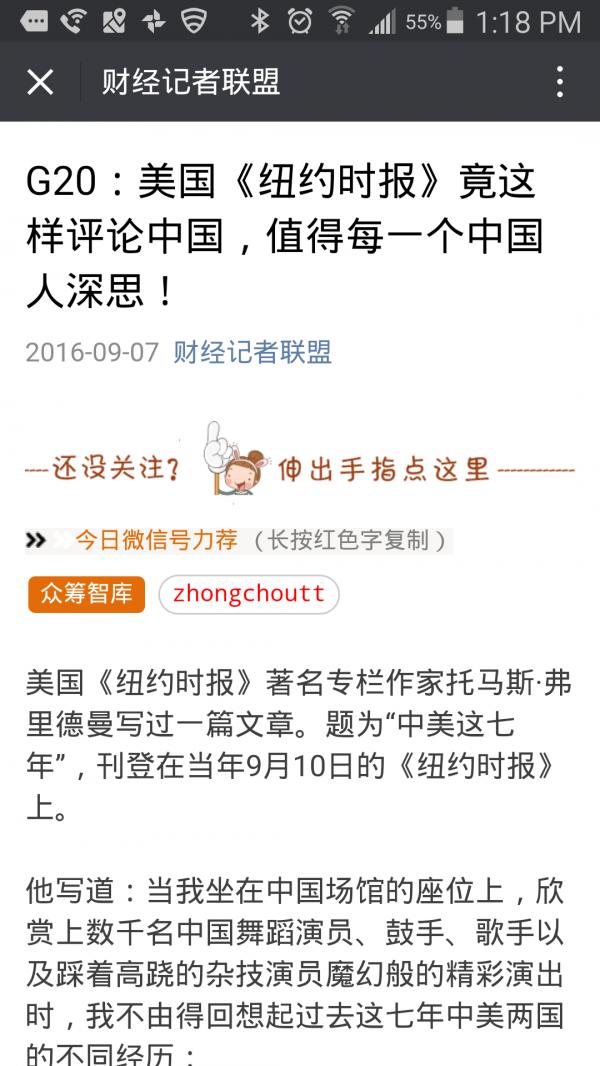微信紐時《中美這七年》譯文大多偽造
微信里流傳美國紐約時報專欄記者托馬斯·弗里德曼(Thomas L. Friedman)一篇《中美這七年》的翻譯文章,來自水木然(ID:smr8700),屬於國內中宣部認可的那類正能量輿論導向:

先是大姐把它傳到微信群,接着馬嫂弟弟把它傳到微信圈,最後堂妹也把它傳到微信群,看來這個微信在國內影響很大。我看了微信,總覺得有點不對勁,很多地方文字不像英文翻譯成中文的,就把英文原文找來一讀,哇!差得太多,可以說80%的內容都不是來自英文原文,而是偽造出來的托馬斯·弗德曼的文章。
請看下面英文原文與中文翻譯對照:
從英文原文第一段到第七段的翻譯,基本上與原文相差不遠:
OP-ED COLUMNIST
A Biblical Seven Years
464
AUGUST 26, 2008
Thomas L. Friedman
Thomas L. Friedman
Beijing
1 After attending the spectacular closing ceremony at the Beijing Olympics and feeling the vibrations from hundreds of Chinese drummers pulsating in my own chest, I was tempted to conclude two things: “Holy mackerel, the energy coming out of this country is unrivaled.” And, two: “We are so cooked. Start teaching your kids Mandarin.”
2 However, I’ve learned over the years not to over-interpret any two-week event. Olympics don’t change history. They are mere snapshots — a country posing in its Sunday bests for all the world too see. But, as snapshots go, the one China presented through the Olympics was enormously powerful — and it’s one that Americans need to reflect upon this election season.
3 China did not build the magnificent $43 billion infrastructure for these games, or put on the unparalleled opening and closing ceremonies, simply by the dumb luck of discovering oil. No, it was the culmination of seven years of national investment, planning, concentrated state power, national mobilization and hard work.
4 Seven years ... Seven years ... Oh, that’s right. China was awarded these Olympic Games on July 13, 2001 — just two months before 9/11.
5 As I sat in my seat at the Bird’s Nest, watching thousands of Chinese dancers, drummers, singers and acrobats on stilts perform their magic at the closing ceremony, I couldn’t help but reflect on how China and America have spent the last seven years: China has been preparing for the Olympics; we’ve been preparing for Al Qaeda. They’ve been building better stadiums, subways, airports, roads and parks. And we’ve been building better metal detectors, armored Humvees and pilotless drones.
6 The difference is starting to show. Just compare arriving at La Guardia’s dumpy terminal in New York City and driving through the crumbling infrastructure into Manhattan with arriving at Shanghai’s sleek airport and taking the 220-mile-per-hour magnetic levitation train, which uses electromagnetic propulsion instead of steel wheels and tracks, to get to town in a blink.
7 Then ask yourself: Who is living in the third world country?
微信譯文:
當我坐在中國場館的座位上,欣賞上數千名中國舞蹈演員、鼓手、歌手以及踩着高蹺的雜技演員魔幻般的精彩演出時,我不由得回想起過去這七年中美兩國的不同經歷:
中國一直在忙於各種場會的各種工作,而我們忙着對付“基地”組織(恐怖分子);他們一直在建設更好的體育館、地鐵、機場、道路以及公園,而我們一直在建造更好的金屬探測器、悍馬軍車和無人駕駛偵察機……
差異已經開始顯現。
你可以比較一下紐約骯髒陳舊的拉瓜地亞機場和上海造型優美的國際機場。當你驅車前往曼哈頓時,你會發現一路上的基礎設施有多麼破敗不堪。再體驗一下上海時速高達220英里的磁懸浮列車,它應用的是電磁推進技術,而不是普通的鋼輪和軌道,眨眼工夫,你已經抵達上海市區。然後捫心自問:究竟是誰生活在第三世界國家?
但是從英文原文第八段到第十五段(結尾)的中文翻譯完全是無中生有,不是翻譯有誤的問題,是完完全全地驢唇不對馬嘴,根本不是作者的意思。
第八段緊接着第七段一開頭原文講的是:”是的,如果你從北京開車出去一個小時,你就會遇到地域廣闊極端貧窮的第三世界的中國。可微信里卻翻譯成:“我認為,作為一個現代國家,中國接受了現代國家主權和人權的主要觀念。” 差十萬八千里。
接下來從第八段到第十五段原文大意講的是:
美國因為911恐怖攻擊,整個國家力量被迫用到反恐上面,耽誤了國家的基礎建設,而中國正是在911以來的7年中,在舉辦奧運的旗幟下,大興土木,完成了很多國家基礎建設。美國今後的7年應該花時間精力重建美國。美國應該迅速接受在伊拉克阿富汗的反恐工作;奧巴馬應該成為重振美國的領導者;美國的重建不是在伊拉克,阿富汗,格魯吉亞,而是在美國本土。此次大選不是那個候選人可以更強硬地面對俄羅斯和賓拉丁的問題,而是那個候選人可以更強有力,更全力以赴,更有創造力,更能最大範圍地團結所有美國人去重建美國等等。
可是請看英文原文後面的譯文,真是風馬牛不相及。講的是中華文明和中國發展模式特點,中國傳統文化復興,中國式人本經濟學,中國“選賢任能”的治國傳統和“民心向背”治國等等,英文原文中沒有一個字談到這些內容。
8 Yes, if you drive an hour out of Beijing, you meet the vast dirt-poor third world of China. But here’s what’s new: The rich parts of China, the modern parts of Beijing or Shanghai or Dalian, are now more state of the art than rich America. The buildings are architecturally more interesting, the wireless networks more sophisticated, the roads and trains more efficient and nicer. And, I repeat, they did not get all this by discovering oil. They got it by digging inside themselves
9 I realize the differences: We were attacked on 9/11; they were not. We have real enemies; theirs are small and mostly domestic. We had to respond to 9/11 at least by eliminating the Al Qaeda base in Afghanistan and investing in tighter homeland security. They could avoid foreign entanglements. Trying to build democracy in Iraq, though, which I supported, was a war of choice and is unlikely to ever produce anything equal to its huge price tag.
10 But the first rule of holes is that when you’re in one, stop digging. When you see how much modern infrastructure has been built in China since 2001, under the banner of the Olympics, and you see how much infrastructure has been postponed in America since 2001, under the banner of the war on terrorism, it’s clear that the next seven years need to be devoted to nation-building in America.
11 We need to finish our business in Iraq and Afghanistan as quickly as possible, which is why it is a travesty that the Iraqi Parliament has gone on vacation while 130,000 U.S. troops are standing guard. We can no longer afford to postpone our nation-building while Iraqis squabble over whether to do theirs.
12 A lot of people are now advising Barack Obama to get dirty with John McCain. Sure, fight fire with fire. That’s necessary, but it is not sufficient.
13 Obama got this far because many voters projected onto him that he could be the leader of an American renewal. They know we need nation-building at home now — not in Iraq, not in Afghanistan, not in Georgia, but in America. Obama cannot lose that theme.
14 He cannot let Republicans make this election about who is tough enough to stand up to Russia or bin Laden. It has to be about who is strong enough, focused enough, creative enough and unifying enough to get Americans to rebuild America. The next president can have all the foreign affairs experience in the world, but it will be useless, utterly useless, if we, as a country, are weak.
15 Obama is more right than he knows when he proclaims that this is “our” moment, this is “our” time. But it is our time to get back to work on the only home we have, our time for nation-building in America. I never want to tell my girls — and I’m sure Obama feels the same about his — that they have to go to China to see the future.
微信譯文:
我認為,作為一個現代國家,中國接受了現代國家主權和人權的主要觀念。但中華文明的種種特質又使它與眾不同。
人口,中國發展模式的一個特點就是:學習+創新+巨大人口產生的規模效應+影響中國和世界。許多境外企業投資中國都有一個口號,只要能在中國做到第一,就能做到世界第一。這個趨勢隨着中國的崛起正在開始擴大到越來越多的領域,如旅遊、航空、影視、體育、教育、新能源、現代化模式、高鐵等。
疆域,我們一些人比較羨慕小國寡民的生活,實際上小國有小國的困難。小國經不起風浪,而大國遇到風浪,迴旋餘地大得多。
智利是相對發達的發展中國家,但2010年一場大地震,GDP就跌掉一大塊,整個經濟可能兩年內都喘不過氣,而中國即使遇到汶川大地震這麼大的天災,整個國家經濟紋絲不動。
對於絕大多數國家來說,產業升級往往意味着產業遷移到外國,而中國在自己內部就可以進行大規模的產業梯度轉移,這就延長了中國製造業的生命周期。
文化,過去三十多年的中西文化碰撞,沒有使多數中國人喪失文化自信。中國人今天的孔子熱、老子熱、誦經熱、書畫熱、茶道熱、舊宅熱、文物熱、中醫熱、養生熱等,都體現了中國傳統文化的復興。
中國人本文化衍生出來的餐飲文化、養生文化、休閒文化也是其他文化所難以比擬的。中國任何地方的街頭餐館都能做出三四十種菜,而在美國絕大多數的餐館只有漢堡包加土豆條,能有三四個菜就不錯了。歐洲餐館的菜餚要豐富一些,但也很少超過七八個品種。
我們有些人總是擔心中國人缺少宗教情懷。其實只要稍微熟悉一點世界歷史的人就知道,人類歷史上宗教衝突導致了無數的戰爭,光是基督教各個教派之間以及基督教與伊斯蘭教之間的衝突就有上千年的歷史,造成了無數生命遭殺戮的人間悲劇。所以,中國人不一定非要信教。
經濟,中國傳統意義上的經濟學,嚴格講不是“市場經濟學”,而是“人本經濟學”。在中國漫長的歷史上,一個政府如果不能發展經濟和改善民生,不能處理好大災大難,就會失去民心的支持,失去“天命”,最終被人民推翻。西方不少人只認同多黨競爭產生的政權合法性,這是十分淺薄的政治觀念。
那麼,我們是否可以用中國“選賢任能”的理念來質疑西方政權合法性的來源麼?小布什執政八年給美國帶來了經濟衰退,給伊拉克帶來了滅頂之災,給世界帶來了金融海嘯,就是一個例子。
中國歷史合法性的最大特點就是“選賢任能”的政治傳統和“民心向背”的治國。
中國政治文化中的“全國一盤棋”、“一方有難,八方支援”等理念,其他文化無法產生。我曾和印度學者一起探討中國模式,他們說從表面看,中國是中央集權,但中國每一項改革實際上都有很強的地方特色,互相競爭又互相補充,所以中國體制要比印度的體制更有活力。
他們學習了西方,已經建立了強大的現代政府體系,但同時又擁有自己獨特的政治文化資源,兩者的結合使我們更容易克服今天困擾西方民主制度的民粹主義、短視主義、法條主義等問題。
在政治層面,西方許多人也想當然地認為隨着中國中產階層的壯大,中國也會接受西方對抗性治理模式。但他們今天也發現,今天的中國中產階層似乎比其他任何階層都更珍惜中國的穩定。他們了解西方“民主化”已經給許多國家帶來混亂動盪,了解自己辛辛苦苦的財富積累得益於中國三十多年的政治穩定。
坦率地說,中國今天所展現出來的一切,絕對不是“先進”和“落後”、“民主”和“專制”、“高人權”和“低人權”這些過分簡約甚至簡陋的概念可以概括的。
平心而論,作者捏造的譯文表達的觀點還是言之有物的,可為什麼不直接作為自己的觀點來表達,而是要把這些自己的觀點偽造成美國紐約時報記者的文章里呢?看來對自己的觀點不自信,崇洋媚外的心裡作崇。大概覺得這些觀點藉由美國洋大人記者的名義寫出來更給力?可你連自己觀點都要打着別人的幌子來表達,你的這些觀點的說服力又在哪裡呢?
|
